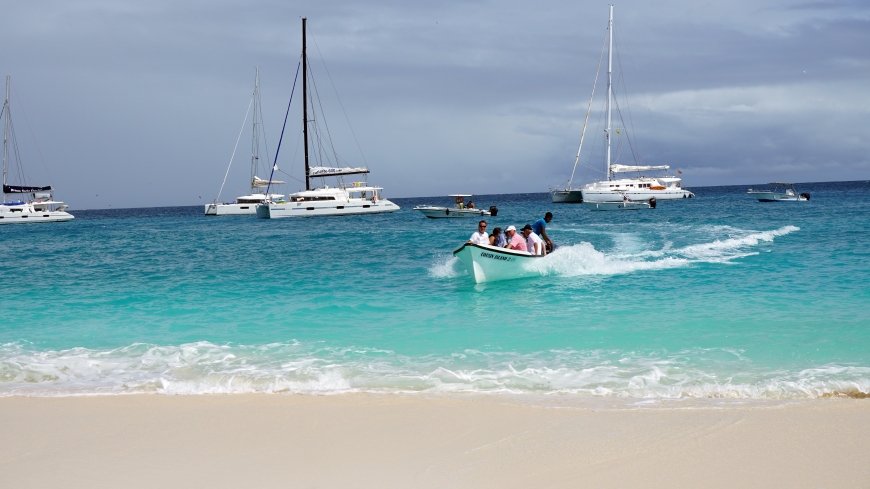A Cousin Island warden must be a multitasking professional. Each of them is involved in ecotourism, boat operations, conservation, biosecurity, island management, equipment and machinery maintenance, surveillance, and patrols.
Their most exciting daily activity is running the Reserve’s highly successful ecotourism program Monday through Friday. In the mornings, between 945 and 1030 am, boats carrying visitors to the island line up offshore as they wait for the landing protocol peculiar to this Special Reserve.
Soon, the trained wardens will drive the reserve boats to the charter boats, retrieving visitors and safely bringing them to the nature reserve. In place for decades, this protocol prevents pest introduction that could harm wildlife on the island.
Driving the boat at high speed onto the beach as they arrive is a highlight of the trip for many tourists. It must, however, be handled cautiously and dexterously during rough seas, such as those experienced during the South East trade winds.
“Getting onto Cousin Island is not easy. The waves are aggressive and you basically have to beach your boat on the sand at full speed when you catch a wave,” said Mr. Scotty Eddy after a visit with Variety Cruises.
Yet these wardens do it daily, many times over.
“This can be physically demanding, but we're used to it,” Christopher explains. He is drenched in seawater from head to toe after driving the boat in the unforgiving Vann Swet trade winds. Despite this, he still smiles and walks with a spring in his step.
Once visitors arrive on land, the same wardens will guide them around the island. Because they are not only guides but also undertake the island's conservation, they can deliver an engaging Cousin story in English and French and answer any questions that curious visitors may have.
They will start with the island's coconut plantation history. They will draw attention to the unremarkable Seychelles Warbler, the reason for the island's existence as a nature reserve, before showcasing the other wildlife. They will call out for the Seychelles Magpie Robins in their territory, search for elusive bronze-eyed geckos and lead visitors to welcoming Aldabra giant tortoises.
The wardens will ensure that groups stay together, answer questions, and provide mosquito-repelling tips. They will also care for elderly visitors if necessary.
Once the tour is complete, they will deliver the guests back to their boats and take their lunch break.
In the afternoon, they must meet the demands of the island's conservation programs.
During the Hawksbill turtle nesting season and seabird breeding period, particularly of Lesser Noddys, these programs become most intense. They will collect data and relay it to the conservation manager. For Wedge-tailed and Tropical Shearwater monitoring and censuses, they might also work in the evenings and at night to collect data on these birds as they return to their nests.
They also have to maintain boats, engines, and other equipment and undertake surveillance patrols to ensure there are no poachers or other incursions into the Special Reserve.
“Cousin doesn’t get the kind of poaching on the other islands. However, a few people try to sneak into the marine reserve to fish and we have to be vigilant,” says Dailus Laurence, the Chief Warden.

